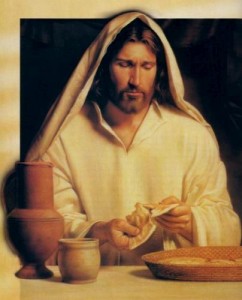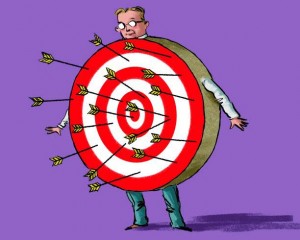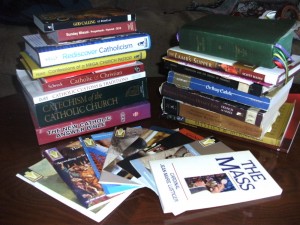I saved the subject of the Eucharist for last because I’ve spent most of this month trying to wrap my mind around the concept (thanks Mentor Jason for being patient with me!). Honestly, it’s nearly as frustrating, amazing, and poetic as the nature of the Trinity. Indeed, when St. Augustine tried to understand the Trinity (the concept of God existing in three persons: the Father, Son, and Holy Spirit), he likened the effort to filling a small, hand-dug hole on the beach with the ocean. The same goes with the Eucharist: the idea that the bread and wine of Communion are literally transformed into the body and blood of Christ by the power of the Holy Spirit.

Lately, my seven-year-old daughter has hounded me about the meaning of the Trinity. I realized that, while I think I understand it in my mind, I sound like a blathering idiot when I try putting it in words. Her eyes eventually glaze over and I tell her not to worry about it because most adults don’t get it either.
But here’s the interesting part. One of the dividing points between Catholics and Protestants is the Eucharist. Catholics take Jesus for his word in passages such as John 6: 48-58 while most Protestants consider Communion as symbolic.
“I am the bread of life. Your ancestors ate the manna in the wilderness, yet they died. But here is the bread that comes down from heaven, which anyone may eat and not die. I am the living bread that came down from heaven. Whoever eats this bread will live forever. This bread is my flesh, which I will give for the life of the world.”
Then the Jews began to argue sharply among themselves, “How can this man give us his flesh to eat?”
Jesus said to them,“Very truly I tell you, unless you eat the flesh of the Son of Man and drink his blood, you have no life in you. Whoever eats my flesh and drinks my blood has eternal life, and I will raise them up at the last day. For my flesh is real food and my blood is real drink. Whoever eats my flesh and drinks my blood remains in me, and I in them. Just as the living Father sent me and I live because of the Father, so the one who feeds on me will live because of me. This is the bread that came down from heaven. Your ancestors ate manna and died, but whoever feeds on this bread will live forever.“
The verses continue describing how many of his disciples were all like, “WTF, Jesus. This is hardcore,” and then left him. Jesus then asked the twelve apostles if they would leave him too and Peter said no.
Jesus continues this bread business during the “Last Supper” (during Passover, which is pregnant with significance) when he calls the bread his body and the wine his blood. He goes on and on without ever implying a metaphor. Jesus never backs down from his insistence that these materials–this food–is what he said they are.

During the Eucharistic prayer of the Mass, the priest will say:
“You are indeed Holy, O Lord, the fount of all holiness. Make holy, therefore, these gifts (bread and wine), we pray, by sending down your Spirit upon them like the dew fall, so that they may become for us the Body and Blood of our Lord Jesus Christ.“
I’ve enjoyed this part of the liturgy since my first Mass this month, but what’s being said never really clicked until now. You can imagine a misty spring morning when low clouds of dew soak the ground. The Holy Spirit is often described as a cloud in the Bible. We also recall how the Spirit “descended” upon Jesus after his baptism. And what about Mary? Did not the Spirit descend upon her, thus bringing Christ to her womb? The Spirit also descended upon the apostles in the Upper Room and many others during Pentecost.
In every case, the Spirit transformed something.

If a Protestant can accept that God is a Trinity of three “persons” in one, if he can believe that God can become fully man and divine in one body, if he can believe that God can die on a cross, if he can believe that Jesus literally raised from the dead, then why does his belief in God’s transformative power and grace stop cold with the Eucharist?
Why does it all of a sudden become symbolic…and yet the other aspects of faith are literal?
Consider this. All matter, all the physical stuff you see around you that you think is solid, is actually 99% empty space on the subatomic level. We and everything around us is empty. As a Protestant, I heard a lot of talk regarding being “filled with the Holy Spirit.”
If we are really empty space, then that means the bread and wine are also empty. If we can be “filled with the Spirit,” if Mary’s womb can be filled with Christ, if the cross can be filled with God, then why can’t the Spirit fill the majority space of the bread and wine, and like everything else the Spirit touches, utterly transform it into the very thing Jesus said it was? Are we not said to be transformed when Christ enters our lives?
But this has greater implications. If our universe is literally 99% empty space, then we are designed to be literal vessels. Vessels for what?
Given today’s topic, you fill in the blank. Unless of course it’s all just symbolic.

